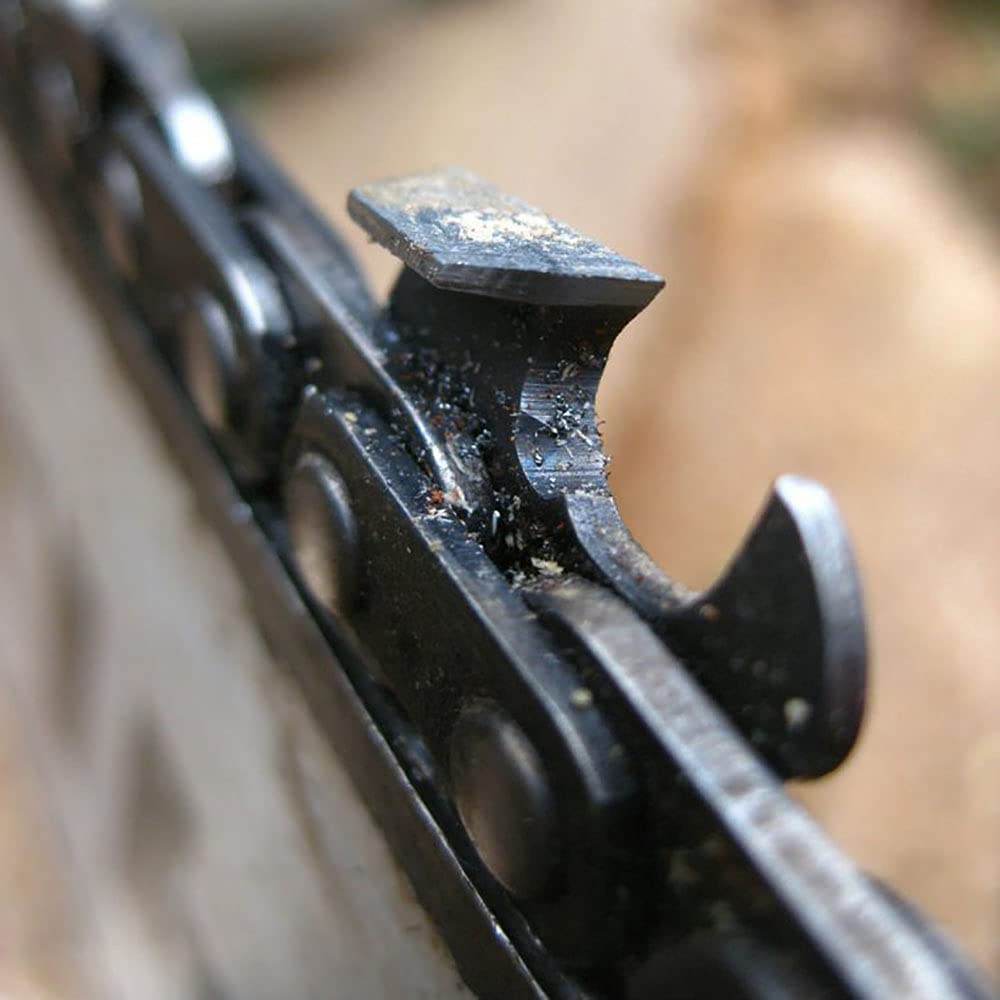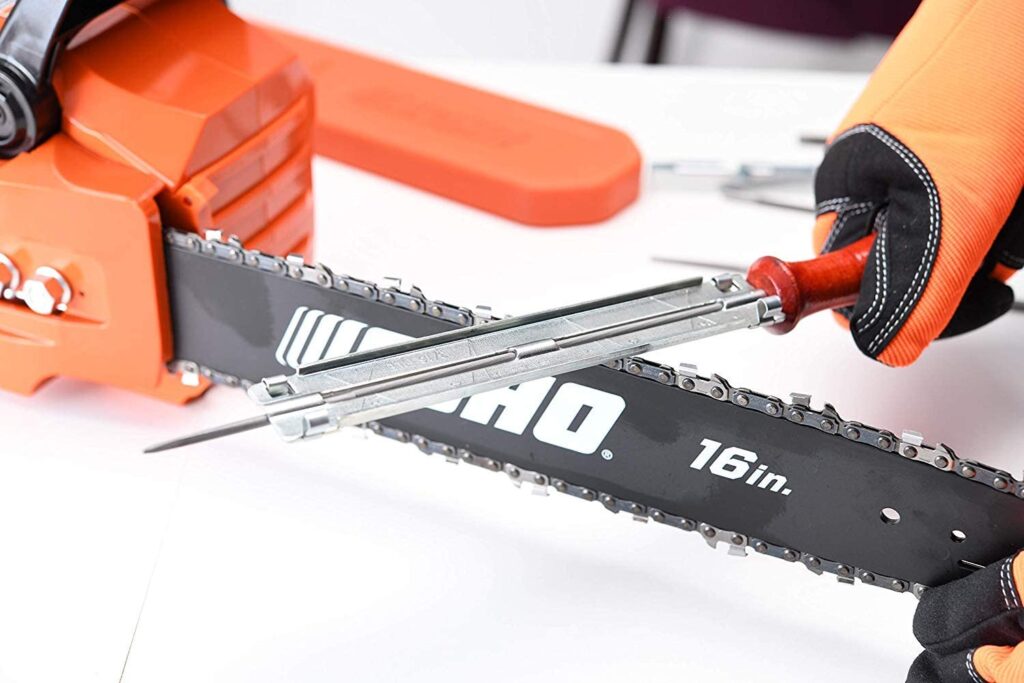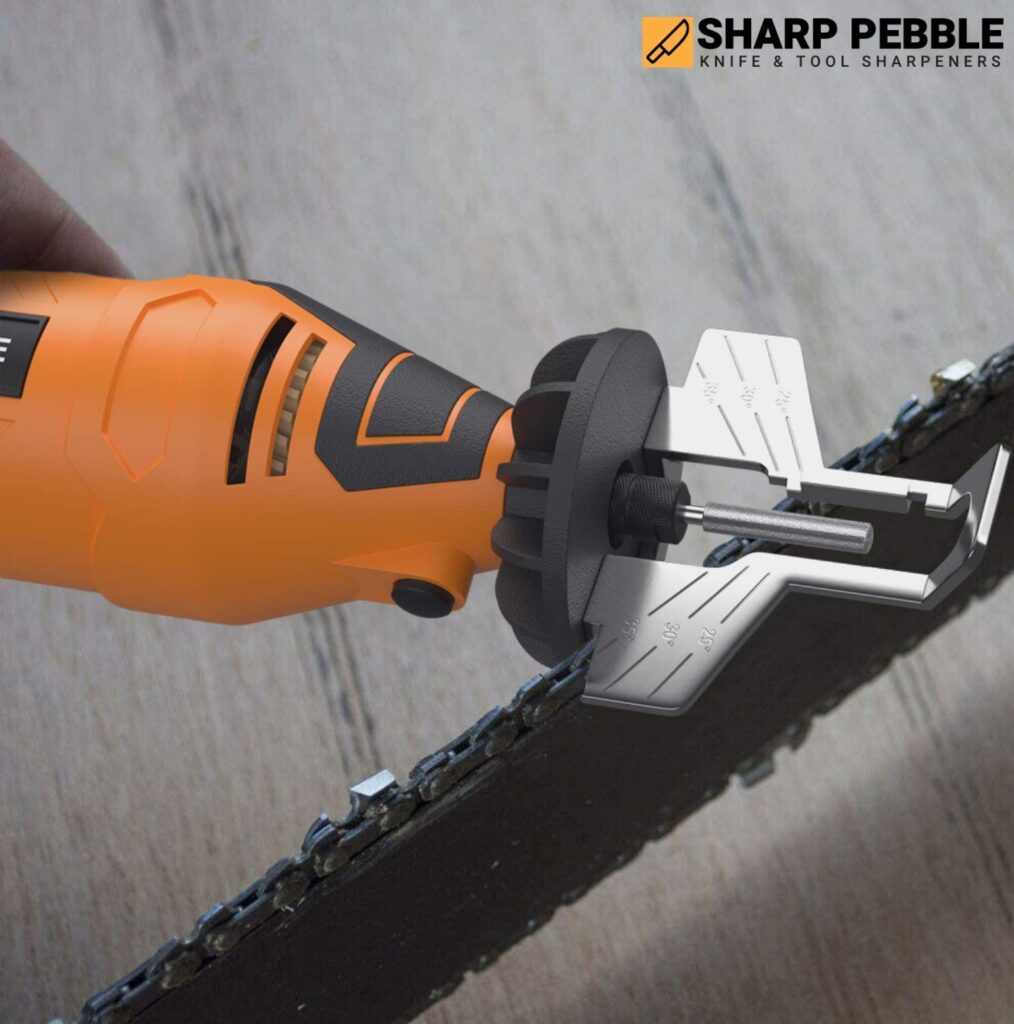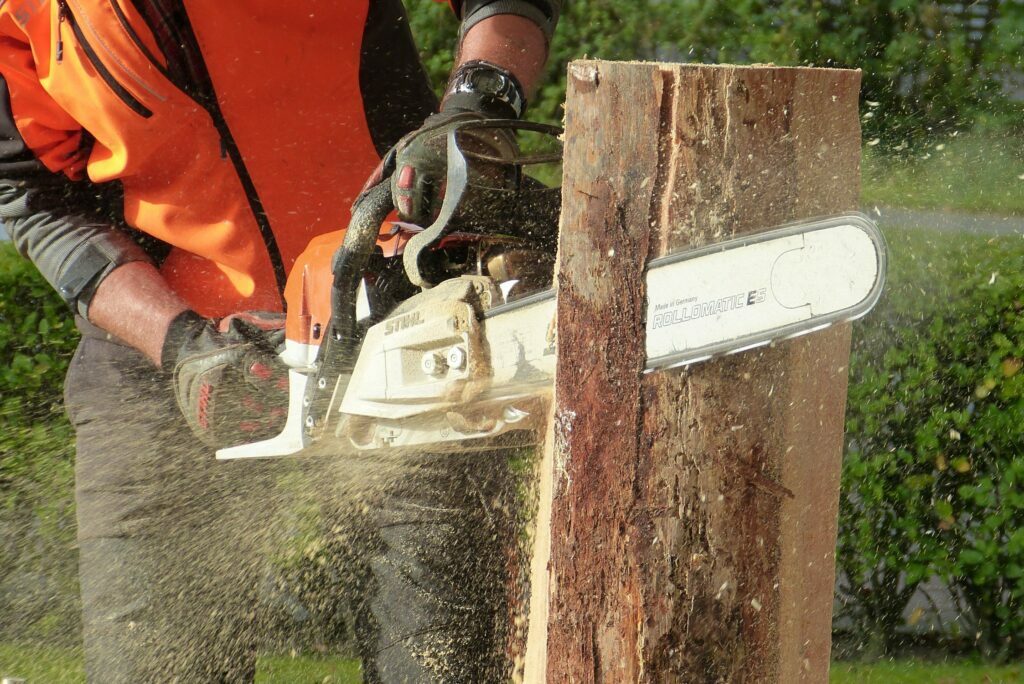
We want our chainsaws to operate consistently, accurately, and safely and make our chain shine like a new one. Moreover having a dull blade can cause buckling and kickback which is dangerous for us. Sharpening the blades regularly will also extend the longevity of our chain, and save time and money in the long run.
Sharpening the chainsaw is vitally important irrespective of the fact that the operator just wants to cut his firewood. Regular use of chainsaws will entail the dullness of your chainsaw’s blade. Operating a dull chainsaw is very hazardous it causes kickback and heats the chainsaw quicker. Moreover, the dull chains take longer to chew through wood.
Hence, regular sharpening of chainsaws is very important. Henceforth, kindly go through the methods below for chainsaw sharpening tricks I use.
Table of Contents
Chainsaw Sharpening Supplies
This is the first and foremost things. Having the right tools will make the work smoother and will reduce the chance of injury. I have given below all the tools you need to maintain your chainsaw, including:
- Gloves, Make sure the gloves are thick enough to tolerate the penetration of the teeth.
- Protective eyewear to protect the eye from sparks.
- Depth gauge guide for sharpening chainsaw blades
- Dremel tool
- Dremel tool blade sharpening kit No. A679-02
- File guide for sharpening chain saw blades
- Flat file
- Round file
| Preview | Product | Rating | Price | |
|---|---|---|---|---|

| NYOrtho Cut Resistant Gloves - Food Grade, High Performance Level 5 Protection Extra Large (1 Pair... | 188 Reviews | $10.49 | Buy on Amazon |

| Super More Anti-Fog Protective Safety Goggles Clear Lens Wide-Vision Adjustable Chemical Splash Eye... | 7,066 Reviews | $12.99 | Buy on Amazon |

| Dremel A679-02 Sharpening Attachment Kit, For Sharpening Outdoor Gardening Tools, Chainsaws, and... | 1,962 Reviews | $19.99 $14.97 | Buy on Amazon |

| GOXAWEE Rotary Tool Kit with MultiPro Keyless Chuck and Flex Shaft -140pcs Accessories Variable... | 13,183 Reviews | $38.99 $35.99 | Buy on Amazon |

| File Set 19pcs, Hand Metal File, T12 Drop Forged Alloy Steel File Set with Carry Case, File tools... | 175 Reviews | $23.99 | Buy on Amazon |

| Katzco Chainsaw Sharpener File Kit - Contains 5/32, 3/16, and 7/32 Inch Files, Wood Handle, Depth... | 3,430 Reviews | $16.99 $12.99 | Buy on Amazon |
Before Sharpening Begins
First of all, we need to find our chainsaw’s pitch size also called a chainsaw link. It is because there are a variety of chainsaws that may have different pitch sizes or teeth. Therefore I recommend having the exact specifications of the chainsaws before sharpening. There is a code/depth gauge marking as etched on the pitch’s side.
In this article, I will provide a guide for choosing the right file for the job of sharpening the chainsaw. It is because the files size deffer to sharpen different sizes of chainsaw’s teeth. Moreover, using the wrong file size for sharpening our chainsaw will damage both the file and the chainsaw.
We need to make sure that the chainsaw is totally free from any kind of dirt debris or any dust which can cause hassle in its functioning. For this, we need to clean it thoroughly before sharpening it or choosing a file to make the process even smoother. Secondly, extract oil and stains using mild detergents and mineral spirits. Finally, check the entire chain to find out the damaged cutters before proceeding. If you find a bend or damage in the chain then I will advise replacing them if possible. (You can use it anyways if the damage is not extreme but, replacing it will be a good option)
Different methods of sharpening Chainsaw Chain
There are myriads of methods for sharpening chainsaws. I will be providing the three simplest methods of sharpening a chainsaw chain.
1. How To Sharpen A Chainsaw with a File
This is the oldest method which was used when chainsaw first came out and that was to file them with a file. Now there are myriads of way to go but, this is still the best method to use. This method is the easiest even my 12-year-old boy follows this method. All you need is the basic knowledge of the different parts of the chainsaw.

30 and 35 degrees are common filing angles for chainsaw sharpening. If we get the wrong angle i.e too steep or too flat we actually end up flatten the edges of the cutters instead of sharpening them.
Therefore, the most important step is to ensure that the file’s diameter matches the gauge of our chainsaw’s blade. The diameter of the file should be equal to the gauge of chainsaw teeth. We can also look into the manual or the label on the original box of your chainsaw for the correct file size.
Filing The Chain
Firstly, we need to file the teeth from the inside towards the outside. Secondly, we have to hold the file at a 90-degree angle to the flat sides of the guide bar and move the file at a 30-degree angle to the straight line of the chain. Then, Make sure to maintain both angles throughout the stroke and not to differ at its end as it will round off the edges just formulated by us. After this, we will gradually proceed towards the filing of each tooth. To avoid heating issues while operating just make sure that each tooth is of equal length after sharpening.
After finishing filing on one side, we need to attach the guide bar from the other direction. For this, simply loosen the vice and attach the guide bar from the other direction. Resume the sharpening process until all the teeth of the other sides are sharpened as well. Then re-attach the chainsaw and we are good to go.
- CONVENIENCE - Katzco complete chainsaw file kit contains every field tool you could possibly need to get your chainsaw back into its optimal condition. The roll-up tool pouch keeps everything you need in one location and allows for great portability so you can bring it wherever and whenever needed
- VARIETY - This kit comes with a range of different files to meet any of your chainsaw sharpening needs. The premium fine tooth flat and round files is made for Fast filing and cutting. The round files come in the sizes of: 5/32”, 3/16”, and 7/32”. The hardwood handle can attach to any of the files and the depth-gauge tool as well and can be used on any chainsaw.
2. How To Sharpen A Chainsaw With A Dremel
Dremel is a high-speed rotating tool that is used for cutting, routing, grinding, sharpening, cleaning, and polishing. It is very simple to operate and helps us to sharp our chainsaw quickly. In this method, we also need to deduce the pitch of our chainsaw via manual. After deducing the pitch of the chainsaw’s chain we need to choose the grinding wheel of the Dremel for the required pitch size.
To simplify the sharpening process with Dremel detach the Blades from the chainsaws. This simplifies our work of sharpening individual blades at a time. I recommend following the chainsaw’s manual for detaching the chains. Still, be careful while detaching the chains as they can easily pierce through the skin. (Wear a glove as advised above)
After equipping the Dremel with the correct accessories and detaching the blade start sharpening the chain. There are a couple of tips that you can follow to sharpen the chains even smoother.
- Turn on the Dremel chainsaw sharpener and run it free for a while.
- In case you can not find out the exact size of a chainsaw. Just make sure the diameter of the grinding wheel is the same as the hole on the chainsaw’s blade.
- Throughout the process try to keep the edge of the metal guide parallel to the tooth
- Highlight the first tooth with a marker. It will help you avoid over-sharpening of the chains as sometimes we forget from where we started.
- Make sure that the thirty-degree line of the guide runs along the chain.
- Ensure that you have a good hold of the Dremel. I recommend using your use your left hand if you are left-handed and right hand if you are right-handeḍ.
- While sharpening the teeth try to exert a little pressure on the edge of the teeth against the blade of the Dremel to make finer cuts.
After following the above steps you will be able to sharp the chainsaw like a pro.
3. How to Sharpen a Chainsaw Blade with an Electric Sharpener
The initial step is to analyze the grinder wheel’s structure. After this, we need to go on to the set vise assembly so that the angle of the top plate is precise. Then we have to set the grinder head angle according to its specifications.

Once our chainsaw sharpener is ready, we have to install a sharpening stone, just make sure the sharpening stone is of the right width. Then check it fit between the gap of the teeth if it fits, then we are good to go.
After following the above steps of setting up the electric sharpener, we can start sharpening. Start by lowering the grinder wheel on the first tooth of the blade. Then you can start the sharpener and will notice sparks which means the teeth are been sharpened. Then simply check if the teeth are shining like if yes continue to other teeth. For a better experience, you can follow the tips provided on sharpening the teeth with Dremel.
Avoid The Following Mistakes while sharpening a Chainsaw
We all make a couple of mistakes during the sharpening of our chainsaws. To avoid injuring our-self or ruining the chainsaw we should be aware of these mistakes. I am providing below some of the common mistakes which we all do while sharpening chainsaws.
- Not wearing safety gloves.
- Using the incorrect size of the chains sharpener.
- Filing the cutters, but not the depth gauge
- Over sharpening of the teeth.
- Using a used and dull sharpener’s grinding wheel to sharpen the teeth.
- Not bracing the saw correctly.
- Sharpening in the opposite direction.
- Not placing the chainsaw in the correct chainsaw sharpening angles.
What To Expect

I am using these methods for more than 10 years now and am very happy with the outcome. After applying either of the three methods you will notice a shine in your blades. Moreover, you will notice that you are able to make quicker and cleaner cuts. And, The chances of kickback and injuries will minimize.
In the long run if we routinely sharpen the chainsaw the life span of the chains will increase. It will be very lucrative in monetary terms as well.
I also routinely clean the chainsaw due to which my chainsaw always sounds new. If you want a complete guide on how to clean a chainsaw you may go to that article by clicking below.
Resources
Here at BestForConsumer, we try our my to provide complete and correct information to our readers. We follow a stern guideline for sourcing the information and refrain from displaying the facts and data that is garnered from tertiary sources because they might have some distorted information that may cause harm to our readers.
- How to Sharpen the Chain on a Chainsaw | Husqvarna USA https://www.youtube.com/watch?v=3ZSritRLDio
- Chainsaw Wikipedia https://en.wikipedia.org/wiki/Chainsaw
- Dremel Wikipedia https://en.wikipedia.org/wiki/Dremel
- File (tool) Wikipedia https://en.wikipedia.org/wiki/File_(tool)
- Sharpening Wikipedia https://en.wikipedia.org/wiki/Sharpening
You May Also Like To Read About
- How To Clean A Chainsaw | Step By Step Guide 2021
- How To Start A Chainsaw | An Absolute Guide 2021
- Best Professional Chainsaw | Honest Review And Guide 2021
- Best Pushblock For Table Saws | Honest Review 2021
- Top 10 Best Felling Wedges for Chainsaws Review of 2021
- Top 12 Best Professional Brush Cutter Reviews of 2021